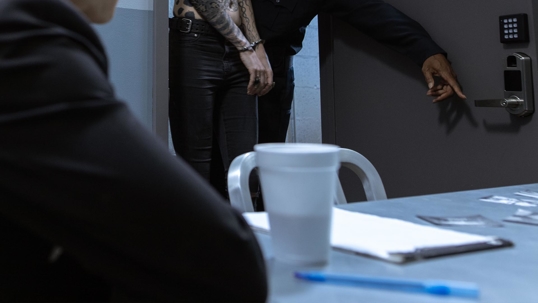Second District Court of Appeals Holds that Suppression of Defendant’s Statements to Police was Proper
Home Blog Second District Court of Appeals Holds that Suppression of Defendant’s Statements to Police was Proper
On May 19, 2017, the Second District Court of Appeals issued a decision affirming the Montgomery County Common Pleas Court’s ruling suppressing statements made to a detective at the Huber Heights Police Department.
In the case of State v. Villegas, 2017-Ohio-2887, Villegas was arrested outside a Huber Heights shopping center, having been found in possession of dozens of counterfeit or cloned credit cards in his vehicle. Villegas was taken to the Huber Heights Police Department, where he was placed in a holding cell. Villegas was later taken to an interview room in the detective section of the police department, where a detective read Villegas his Miranda rights using a pre-interview form. Villegas declined to speak to the detective, and he did not initial or sign the form. The detective asked no additional questions, and Villegas did not request an attorney. Villegas was then escorted back to the holding cell.
As they approached the holding cell, Villegas asked the detective what the “process” or “procedure” would be from there. The detective responded that Villegas did not have a bond and would remain detained. The detective further stated that he would speak with the prosecutor about the case the next day, and if the prosecutor approved the charges, then there would be some court proceedings. Villegas then asked, “What if I sign your paper?” The detective understood Villegas to be referring to the waiver of rights form. The detective stated that it would not change the process, but that it would give Villegas an opportunity to tell his side of the story, which could make things better by minimizing or mitigating his involvement. Villegas then spoke to the detective and made potentially incriminating statements fore again exercising his right to remain silent.
Villegas was ultimately indicted on 73 counts of Forgery and 13 counts of Identity Fraud. He subsequently filed a motion to suppress the incriminating statements he made to the detective. A hearing was held. The trial court granted Villegas’ motion, stating: “During the walk, Villegas reinitiated conversation, asking about the procedure and making a statement that the vehicle was a rental. [The detective] then asked Villegas a series of questions and informed Villegas he had a chance to make it better before Villegas again refused to answer any other questions. No further questions were asked of Villegas.” The trial court suppressed all of the statements Villegas made to the detective, finding that the detective did not “scrupulously honor” Villegas’ right to remain silent.
The State of Ohio appealed the trial court’s decision. The State argued that Villegas made “unprompted” statements, that he freely reinitiated conversation with the detective, and that he knowingly, intelligently, and voluntarily waived his right to remain silent after initially invoking it. The State further argued that the police “scrupulously honored” Villegas’ Miranda rights by not interrogating him when he initially indicated that he did not want to talk and, after Villegas reinitiated the conversation, by again ceasing any question after Villegas stated that he no longer wished to talk.
The Second District disagreed with the State’s argument. Under the Fifth Amendment, no person shall be compelled to be a witness against himself or herself. In order to ensure that this right is protected, statements resulting from custodial interrogations are admissible only after a showing that the procedural safeguards described in Miranda v. Arizona have been followed. To counteract the coercive pressure of custodial interrogations, police officers must warn a suspect, prior to questioning, that he or she has a right to remain silent and a right to the presence of an attorney. The opportunity to exercise these rights exists throughout the interrogation, and thus, the interrogation must cease when the defendant exercised his “right to cut off questioning,” which must be scrupulously honored.
A defendant may waive his or her Miranda rights after previously invoking them. But, it is well established that, once a defendant in custody invokes his Miranda rights, no further interrogation is permitted unless the defendant initiates further conversation with the police. A defendant “initiates” conversation when his statements show “a willingness or desire” for further discussion about the crime. Some inquiries, however, such as a request for a drink of water or a request to use a telephone are so routine that they cannot be fairly said to represent a desire on the part of an accused to open up a more generalized discussion relating directly or indirectly to the investigation. Even when further conversation is initiated by the defendant, if re-interrogation follows then the prosecution bears the burden to show a knowing, intelligent, and voluntary waiver of the defendant’s Fifth Amendment rights under the totality of the circumstances.
In the present case, after invoking his right to remain silent, Villegas asked the detective what the “process” or “procedure” would be going forward. The Second District did not find that this question by Villegas was sufficient to show a willingness and a desire to discuss the subject of his criminal case with the police. Rather, it expressed a desire to know what the process would be from then on out.
Even if Villegas’ initial question constituted an initiation of conversation, the Court still had to determine whether valid waiver of the right to counsel and the right to silence had occurred. The fact that Villegas reopened the dialogue with the detective is a relevant, but not dispositive, consideration. In this case, immediately after the detective explained the procedures going forward, Villegas asked, “What if I sign your paper?” Villegas’ question simply asked the detective about the consequences of signing the waiver of rights form; it did not express a desire to waive his Fifth Amendment rights. The detective responded that if Villegas signed the form, he would have an opportunity to tell his side of the story and help himself by minimizing or mitigating his involvement. The detective’s answer went beyond answering that the process would be the same, but that Villegas would be waiving his rights. Instated, it encouraged Villegas to waive his constitutional rights by emphasizing that Villegas could help himself by talking with the police. Thus, the Court found that the detective’s answer to the question about signing the waiver of rights form was the functional equivalent of unlawful interrogation, and Villegas proceeded to discuss the details of the criminal offense for which he was in custody and for which he had shortly before invoked his right to remain silent.
This case represents yet another example of the fine line that law enforcement officers must walk in order to obtain evidence. The law is not always clear, and mistakes can be made. Sometimes the mistakes of law enforcement officers can result in serious criminal charges and consequences. An experienced criminal defense attorney can challenge evidence that has been unlawfully obtained. If you or someone you know is being prosecuted for a criminal offense contact Criminal Defense Attorney Jonathan Horwitz at Horwitz & Horwitz, LLC, now located in the heart of Centerville, Ohio.
Footer
Horwitz & Horwitz, LLC
201 W. Franklin St., Ste. C
Centerville, OH 45459
t:(937) 828-5534
f: (937) 828-5534
Copyright © 2024
Horwitz & Horwitz, LLC
201 W. Franklin St., Ste. C
Centerville, OH 45459
t:(937) 828-5534
f: (937) 828-5534

